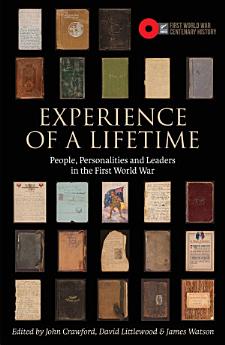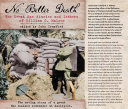Experience of a Lifetime: People, personalities and leaders in the First World War
About this ebook
However, the ongoing reinterpretation of the First World War reveals that matters were rather more nuanced and complex. Hardship and death were all too common, but there were positive experiences, too. Vast numbers of people, for example, travelled to new parts of the world and encountered new cultures, inspiring a sense of wonder and respect. Military tactics were improved, and great military commanders of the inter-war and Second World War periods came to prominence during the First World War. The conflict also had a formative influence on politicians, writers, artists, union leaders, businessmen and some ethnic minorities, who used their participation to press for equal rights and full citizenship. This book’s 16 chapters, written by a range of leading New Zealand and international historians, explains how.
About the author
David Littlewood is a lecturer in history in Massey University’s School of Humanities, Media and Creative Communication, and has been the Manawatu campus offering co-ordinator for Tu Rangaranga: Global Encounters since 2019. His research focuses on how involvement in the two world wars impacted on New Zealand society. His first book was Military Service Tribunals and Boards in the Great War: Determining the fate of Britain’s and New Zealand’s conscripts (Routledge, 2018), and he is currently working on a follow-up that analyses New Zealanders’ experiences of conscription during the Second World War.
John Crawford is the New Zealand Defence Force Historian. He is a member of the Governance Group of the First World War Centenary History Programme, and is currently working on a volume in the series dealing with the organisation of the New Zealand Expeditionary Force. John has written on many aspects of the history of the New Zealand Armed Forces and defence policy. His most recent publications include a revised edition of No Better Death: The Great War Diaries and Letters of William G. Malone (Auckland, Exisle, 2014) and The Great Adventure Ends: New Zealand and France on the Western Front (Christchurch, John Douglas, 2013), which he edited with Nathalie Philippe, Christopher Pugsley and Matthias Strohn. James Watson is Associate Professor in History at Massey University. He has taught a wide range of papers, principally in New Zealand and international history, since arriving there in 1987. His research interests are largely focused on the relationship between New Zealand and the United Kingdom, particularly in the twentieth century, but also include rural history and the history of technology. His most recent book was W.F. Massey: New Zealand in the Haus Makers of the Modern World series on the Paris Peace Conference. He is currently writing a book on the New Zealand home front, as part of the First World War Centenary History series.





